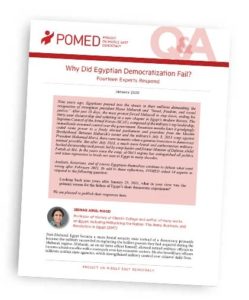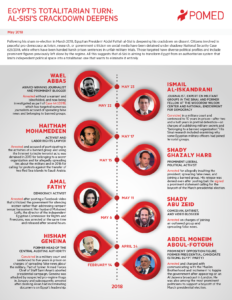Ten years on, why did Egypt’s attempted democratic transition fail? What are the lasting effects of January 25 on politics and society? How does al-Sisi’s regime differ from Mubarak’s? What are the main sources of instability in Egypt today, and what might a future popular uprising look like? the Project on Middle East Democracy asks.
Pro-democracy activists lapsed into squabbling about whether it would be better to amend the existing constitution or scrap it in favor of a new one. Mohamed ElBaradei advocated an inclusive roundtable process to write a new constitution, but he received little support for the idea either locally or internationally, says National Endowment for Democracy (NED) board member and Carnegie analyst Michele Dunne:
The SCAF, by contrast, moved quickly, presenting a plan for limited constitutional amendments barely two weeks after Mubarak was ousted and getting Muslim Brotherhood support. This set in place a dynamic—political forces struggling against one another and losing public support, while the military played each against the other—that caused the Egyptian effort at democracy to fail from the outset.
 Countries such as Egypt and Jordan are seeing less aid from their richer allies, which had in the past helped shore up their governments, as well as a falloff in remittances from citizens who work in gulf economies but are now being sent home as a recession bites, the Post adds:
Countries such as Egypt and Jordan are seeing less aid from their richer allies, which had in the past helped shore up their governments, as well as a falloff in remittances from citizens who work in gulf economies but are now being sent home as a recession bites, the Post adds:
Further instability seems inevitable, said Fawaz Gerges, professor of international relations at the London School of Economics. He believes the upheaval of the past 10 years represents the start of a long process of change that will eventually lead to a transformation of the Middle East…. He also fears that the unrest could be more violent than it was a decade ago.
“I don’t think we’re going to see any stability as long as dictators and military intelligence agencies continue to suffocate society,” he said. “The status quo is untenable, and the next explosion will be catastrophic,” he predicted. “We’re talking about starvation, we’re talking about state collapse, we’re talking about civil strife.”
Upon Mubarak’s ouster, the Muslim Brotherhood could have formed a cross-ideological coalition with secular forces against the military to demand core and early democratic reforms, adds Amy Hawthorne, Deputy Director for Research at the Project on Middle East Democracy. This would have required the group to moderate some of its positions and to exercise restraint in its pursuit of immediate influence, she observes:
But such a pro-democracy alliance would have made it much harder for the military to divide and then to conquer the opposition. Tragically, the Brotherhood instead chose to expand its own power by cutting a deal with the military in March 2011. At every subsequent key juncture through July 3, 2013, the Brotherhood appeased the deep state, sided with ultra-conservative Islamists, alienated liberals, and failed to champion democratic reforms—except for free elections that it won.

Project on Middle East Democracy
From the uprising’s outset, the military worked to undermine the democratic transition. It succeeded in part because, since the 1952 revolution, the military had cultivated its status as “guardian” of the state and of Egyptian identity, argues Shadi Hamid, Senior Fellow at the Center for Middle East Policy, Brookings Institution; and author of Islamic Exceptionalism (2017) and Temptations of Power (2014):
Thus, when the generals moved against the Muslim Brotherhood in mid-2013, they were more likely to gain the support of liberals and secularists who believed the Brotherhood represented a breach with what Egypt had been. By contrast, when secular forces in post-revolution Tunisia called for a military intervention against the elected Islamist-led government there, the Tunisian army, proud of its nonpolitical image, declined to act.
On the tenth anniversary of the start of Egypt’s uprising, @MagedMandour reflects in @SadaJournal on how Sisi cemented his repressive regime.
Democratic transitions are very hard, fraught with political actors’ clashing agendas, difficult
choices, and many other challenges, notes Khalil Al-Anani, Senior Fellow, Arab Center Washington DC; and Associate Professor of Political Science, Doha Institute for Graduate Studies. Without the key players’ ability to navigate these challenges, including by making tough compromises, a transition is destined to fail. Egypt’s sad tale has become a guidebook on what not to do for countries seeking successful democratization.
 A surgeon active in opposition politics before the uprising, Shady el-Ghazaly Harb believes the uprising’s ideas have lived on, both in protests in Sudan, Algeria and Lebanon, and in Egypt itself, Reuters reports.
A surgeon active in opposition politics before the uprising, Shady el-Ghazaly Harb believes the uprising’s ideas have lived on, both in protests in Sudan, Algeria and Lebanon, and in Egypt itself, Reuters reports.
“It changed the collective consciousness of a nation of 100 million,” he said.
The Arab Spring shattered a long-held myth that authoritarianism equals stability, said Brookings’ Tamara Cofman Wittes. She recalled the scramble inside the Obama administration to adjust to the 2011 toppling of Mubarak, who had been seen as a bulwark of U.S. policy aimed at securing stability in a volatile region, the Post adds.
“No one saw the Arab Spring coming,” she said. “Repressive states always look stable, but when a government relies on coercion as a primary means of survival, it’s inherently unstable.”
Please view NED grantee POMED’s special event (above), “Ten Years Since Tahrir Square: Egypt Then and Now,” with an outstanding group of Egypt experts.
I watched Egypt’s bloody struggle for democracy that began in Tahrir Square 10 years ago today. Here’s my diary of 18 days that shook the world. https://t.co/9ViCPAsHXq via @businessinsider
— Democracy Digest (@demdigest) January 25, 2021







